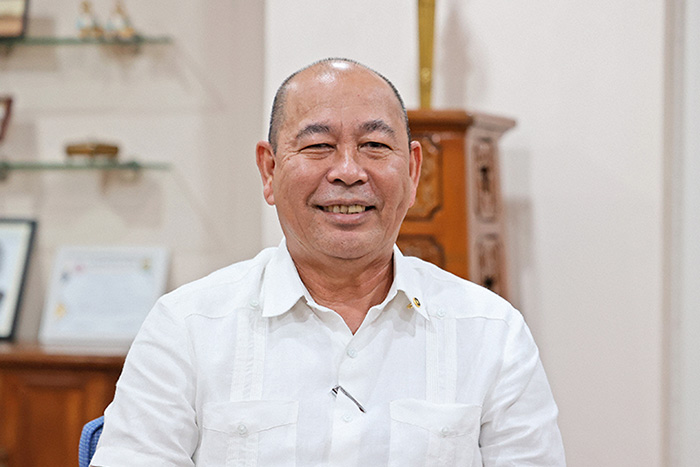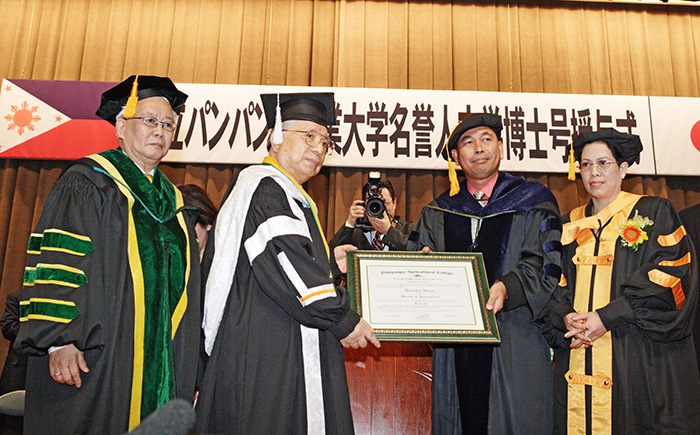Interview with Dr. Zosimo Battad
March 4, 2025
[The following is excerpted from an interview with Dr. Zosimo Battad, conducted by the Seikyo Shimbun and published in the paper on March 4, 2025. In this interview, he reflects on encounters with SGI President Daisaku Ikeda (1928–2023) and offers insights into the enduring impact of the philosophy of Soka education and Ikeda’s philosophy of peace.]
Seikyo Shimbun: I heard that you first learned about Mr. Ikeda in 2004, through an acquaintance who is a member of the Soka Gakkai in the Philippines.

Dr, Zosimo Battad, President of the University of the East, Philippines
Dr. Zosimo Battad: Yes. At that time, I received a collection of Mr. Ikeda’s poems and photographs. I have a personal interest in poetry recitation and photography, and when I encountered Mr. Ikeda’s poetry, I was deeply moved in a way that words cannot express. I also came to love the photographs he had taken. I’ve recited Mr. Ikeda’s poetry many times and have memorized some to the point that I can recite them by heart.
Seikyo: In March 2006, you visited Soka Schools as the president of then Pampanga Agricultural College to confer an Honorary Doctorate of Humanities upon Mr. Ikeda.
Battad: My grandfather, Zosimo Montemayor, served as the principal of Central Luzon Agricultural School, the predecessor of what is now Central Luzon State University. During World War II, the Japanese military seized the school and used it as a garrison. My grandfather was forced to participate in the infamous Bataan Death March, experiencing the horrors of war firsthand.
[In April 1942, the Japanese military, having invaded the Philippines, forced some 70,000 prisoners of war and civilians to march approximately 100 kilometers from the southern tip of the Bataan Peninsula to a northern prison camp. Deprived of adequate food and water, an estimated 20,000 perished during the march.]
Having keenly reaffirmed the importance of education amid the ravages of war, my grandfather went on to establish the Mindanao Agricultural School after the war. That institution later evolved into Central Mindanao University, where he served as president for many years, passionately dedicating himself to education. I believe his achievements were truly significant.

Dr. Battad, then president of Pampanga Agricultural College, awarding Mr. Ikeda with the college’s Honorary Doctorate of Humanities award (Tokyo, March 2006)
Likewise, Mr. Ikeda, who also experienced the tragedy of war, went on to establish Soka educational institutions around the world. He is someone who has embodied the highest value—that of education—and whose life and philosophy represent a profound legacy for all humanity. It was with deep respect and gratitude for his immense contributions to education that we (Pampanga Agricultural College) conferred upon Mr. Ikeda the Honorary Doctorate of Humanities.
Seikyo: Prior to the conferment ceremony, you had an opportunity to speak with Mr. Ikeda.
Battad: At the time, Mr. Ikeda was already 79 years old, but he appeared to be in excellent health. He seemed to know a lot about me and even proposed planting a cherry tree for Pampanga Agricultural College at Soka University in Japan. I presented Mr. Ikeda with two biographies—one of myself and another of my father, who had formerly served as president of the university. He seemed very pleased with the gifts. After the ceremony, we also had a warm conversation in front of a bust of Dr. Linus Pauling.
Seikyo: Your family has been active in the field of education for three generations and has made significant contributions to the education sector in the Philippines. From your perspective, how do you view Mr. Ikeda as an educator?
Battad: I believe that Mr. Ikeda, by founding Soka Schools and Soka Universities, realized the visions of Tsunesaburo Makiguchi, the father of Soka education, and that of his mentor, Josei Toda. Mr. Ikeda was himself an educator with a clear and far-reaching vision for the future.
Establishing institutions that foster future leaders is one of the most noble and value-creating endeavors. He acted with foresight and steadily built citadels of Soka education around the world. Truly, he lived a remarkable life—one that could be likened to accomplishing the work of a hundred years in a single year.
Seikyo: In February 2018, the first “Ikeda Symposium” was co-hosted by the University of the East and Soka University. The second was held in February 2020, with you playing a central role.
Battad: What inspired me to organize the Ikeda Symposium was my attendance at the 9th International Forum on the Research on Daisaku Ikeda’s Philosophy of Peace held at the Chinese Culture University in Taiwan in March 2015. I was deeply moved to witness scholars from various countries engaging in thoughtful dialogue and study of Mr. Ikeda’s philosophy. I felt strongly that young people in the Philippines should also have the opportunity to learn from Mr. Ikeda’s humanistic ideals, which led to the decision to hold the symposium.
We held it in February because that’s the month when the People Power Revolution took place in our country. Also known as the EDSA Revolution or the February Revolution, it toppled a dictatorship that had lasted for over 20 years and ushered in democracy through non-violent means—through the power of the people. It was a symbolic event demonstrating that peaceful societal change is possible without wielding guns or other weapons. I wanted the younger generation to learn about and deeply reflect on the true foundations of peace.
Seikyo: What themes were discussed at the two symposia?
Battad: The first symposium was held under the theme “Harnessing the Values of Peace for Sustainable and Inclusive Growth,” with around 300 participants—including faculty, researchers and students—from 16 universities in the Philippines and abroad. The second symposium, titled “Mainstreaming Youth Participation in Peace, Human Rights and Environmental Protection,” took place at the University of the East Caloocan campus, where I was serving as chancellor at the time. Although the COVID-19 pandemic was just beginning to spread, we were determined to host the event to convey the enduring value of Mr. Ikeda’s philosophy.
Dr. Stuart Rees, an Australian peace scholar, gave the keynote address. He spoke about the importance of nonviolence and altruism, grounded in Mr. Ikeda’s philosophy, in achieving the United Nations’ Sustainable Development Goals (SDGs). I believe the event conveyed to the youth a clear and concrete vision of the world of peace we aspire to achieve. I was overjoyed that the symposium bearing Mr. Ikeda’s name concluded so successfully.
[The first Ikeda Symposium drew considerable attention, with articles announcing the event published in all three of the country’s major newspapers, along with coverage by GMA Network, one of the Philippines’ two largest television networks. Both symposia were officially recognized as international academic conferences by the Commission on Higher Education of the Philippines.]
Seikyo: You have spoken highly of Mr. Ikeda’s annual peace proposals, which he issued each year on January 26 to mark the establishment of the Soka Gakkai International (SGI). In today’s world, marked by ongoing conflicts, the climate crisis and widening social inequality, what role do you believe his philosophy plays?
Battad: Mr. Ikeda had friends not only in Japan and the Philippines but all over the world—in Australia, India, the U.S. and beyond. Many speak highly of his greatness, and I believe that alone speaks to the excellence of his philosophy. He once visited the Soviet Union and held a dialogue with President Gorbachev. He also visited the U.S. to engage in dialogue with leaders and intellectuals, steadily expanding his circle of friendship worldwide. And by founding the SGI, he transformed the Soka peace movement into a global effort.
One root cause of war is the tendency to disregard or dismiss beliefs or faiths different from our own. If people truly respected one another’s religion and way of thinking, war would never occur. In that sense, I believe Mr. Ikeda’s annual peace proposals should be preserved and passed on as a lasting legacy for peace. His proposals also deserve broader recognition from leaders around the world.
If world leaders embraced Mr. Ikeda’s proposals, I believe war would not occur. Wars are also driven by human ego and the desire for power. As the proverb goes, “If you want to test a person’s character, give them power.” Some people change once they come into power. They use that power to amass wealth, pursue conquest and seek to seize more territory.
From this standpoint, becoming a true leader is extraordinarily difficult. What matters is whether those who aspire to lead have learned—through education—to respect human rights and to value the beliefs and convictions of others. An education that fails to cultivate a rich and humane character cannot be considered true education.
Seikyo: Finally, what are your hopes for the younger generation in advancing the cause of world peace?
Battad: I believe the purpose of education is to nurture respect for others and for different cultures, and to foster friendships. Soka education embodies these very principles. My grandfather, my father and I—three generations involved in education—have always shared the same goal: to build an educational system that cultivates good character. For it is character that serves as the greatest measure of success in life. Success is not about accumulating wealth or obtaining academic degrees—it lies in developing a noble character.
I always tell my students: “It’s good to accumulate wealth, but only if it is for the purpose of helping others.” Nurturing young people with rich character—that is the purpose of my life, and achieving it is my greatest happiness.
Dr. Zosimo M. Battad is the president and chief academic officer of the University of the East in the Philippines, a position he assumed in January 2023. In 1999, he became the youngest president of a national university in the Philippines when he was appointed president of Pampanga Agricultural College (now Pampanga State Agricultural University). In recognition of his contributions to education and peace, he was awarded an honorary doctorate by Soka University on October 9, 2010, in Tokyo, Japan.
Share this page














